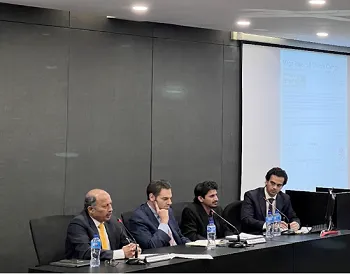A panel discussion on “Mega Projects and Climate Change: Transnational Development Perspectives on BRI and B3W,” was also held in the afternoon of Friday April 26 2024 at BNU in collaboration with the BCPR and BNU’s Razia Hassan School of Architecture (RHSA).

The event was moderated by Ghammaz H. Sandhu, Assistant Professor RHSA and Coordinator of CURE, the Centre for Urban and Rural Environments, with opening remarks by Dr. Yinghao He from the Institute of Belt and Road & Global Governance, Fudan University. The panelists included Michael Kugelman, Director of the South Asia Institute at the Wilson Center in Washington D.C; Ambassador Mansoor Ahmad Khan, Head of the Initiative on Pakistan’s Place in the World at the BNU Centre for Policy Research (BCPR); Dr. Atif Bilal, Associate Professor at the University of Engineering and Technology Lahore as a specialist in Sustainable Urban Development and Urban Transport Planning; and M. Omar Farooq, Head of Department of RHSA. In her opening remarks, Dr. He set the tone for the discussion by stressing upon the urgency of the questions pertaining to climate change and called attention to the fact that climate change knows no borders and affects everyone, thus it requires cooperation and immediate attention. Two over-arching themes emerged from this discussion, which featured enthusiastic participation from the students and academics in the audience. One line of discussion focused on the effects of the BRI and B3W on climate change and the environment as both projects involve massive infrastructural development. The second line of discussion grappled with the political dimensions of the two mega-projects. Panelists addressed the larger question of the BRI and B3W as avenues of Chinese and American regional competition. Mr. Kugelman emphasized that the US was initially supportive of the BRI and hoped to collaborate with China and Pakistan in the project, however the US official perspective has changed to one of competition with Chinese involvement in Pakistan under the BRI. The audience also brought up crucial questions about climate justice, questioning whether it was fair that countries like Pakistan are among the most affected by climate change despite being minor contributors to global environmental degradation, and that Pakistan is dealing with the negative environmental consequences of the industrialization of developed countries such as the US. The event also featured the launch and distribution of the Policy Paper on “Setting Future Agenda of Pakistan-US Relations Around Trade, Investment and Climate Change,” written by Ambassador Mansoor Ahmad Khan at the BCPR under the American Studies Initiative (ASI). The copies of the Paper are also being dispatched to senior officials, leading think-tanks and senior journalists covering foreign policy subjects in print and electronic media.
13 KM Off Thokar Niazbeg - Raiwind Road, Tarogil, Lahore - 53700, Pakistan

